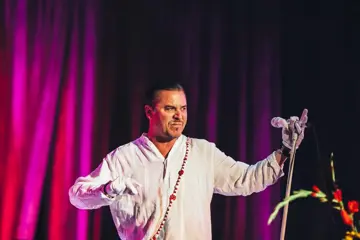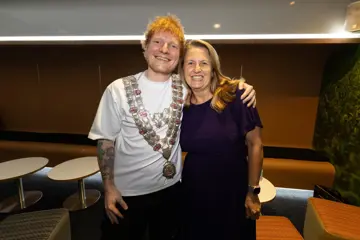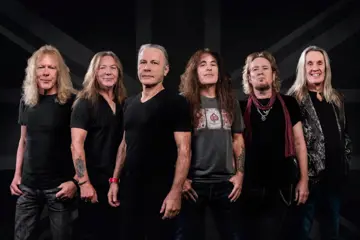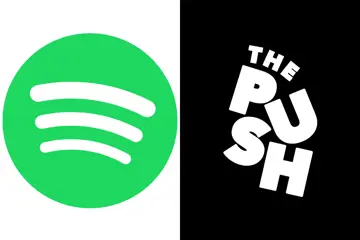Triple One is a group that is impossible to define. Throughout history, rap groups are associated with common traits, a collective of individuals with common experiences, flavours aesthetics that combine to create a unified experience. Triple One on the other hand, is a creative zeitgeist that breaks this mould.
It consists of four main characters. The harsh fired raps of Obi Ill Terrors, known for his tenacious and versatile vocal performances. Marty Bugatti’s trademark delivery also shines through on the surface who consistently delivers deeply introspective verses over all types of beats. Then often follows Lil Dijon, whose passionate vocals drive the melodic sections of their tracks. Their creative backbone is Billy Gunns, the in house producer, sonic mastermind behind the group.
Each member delivers their own unique lived experiences, sonic inspirations, cultural background to present the super group that is Triple One. It’s the middle ground in which they meet creatively that makes them one of the biggest forces in hip-hop music in Australia. It’s this energy that manifests on their most recent project, A DANGEROUS METHOD VOL.1.
The experimental project follows their highly adored, critically acclaimed debut effort, Panic Force. The record was a vast, concept based sonic exploration into Triple One, following a near decade of EPs, singles and creativity. The project was a vignette into the ferocious force that is Triple One, tracking their thrilling peaks and lows, in the context of raw reflection.
Don't miss a beat with our FREE daily newsletter
Its follow up, A DANGEROUS METHOD VOL.1 tracks the projects distinct sonic ethos, with more room for experimentation, freedom and expression outside of the limitations and pressure of a debut album. "A lot of this music is highly experimental and not all of the songs went together," they say.
"We needed to split them up into two more cohesive tapes."
With it, they continue to mash up their influencers, culminating in a project that sees the group relinquish all control and submit to their creative desires. From the drum n bass meets breakbeat inspired opener GUNSHOW, the aggressive, trap banger DRIVING RANGE / TEE OFF, to the deeply introspective, nostalgia driving GHOST, Triple One’s diversity is well on show.
Its title is a nod to Freud’s work with the subconscious mind, and the process of self-reflection and growth that the band have had to endure. “When we make music and live our lives, we are not sure what we will uncover, or what the results will be. That uncertainty can feel dangerous.” says Marty Bugatti.
Following the release of the mixtape, we chat to Obi Ill Terrors and Lil Dijon on the pressure in following up a debut album, the dynamics of the group and how that effects creativity and constantly evolving as a project.
Parry: Wanted to open with the Moree Block party you performed with Kobie Dee. Billy and Marty reflected on it as highlights in their careers. How do you reflect on that experience and where does it rank up overall?
Lil Dijon: It was a different feeling to a show that I had never had before. It was community based and it was cool to be a part of that community for a brief moment in time. It was great to play a show for people that rarely see live shows in their life, and it was great to be a part of that. Very wholesome, fulfilling and heartwarming.
Obi Ill Terrors: Just having people come up to us. One person came up and was saying that they had just seen Bliss N Eso a few months ago, and he travelled down to Moree for this show from a while away. He was asking about rapping and advice. It was good to be present and give back.
Parry: Your new project comes off the back of your debut album Panic Force, which was such a landmark moment and a career highlight. You released it in pretty much the middle of COVID. What was the feeling like after the Panic Force moment passed. Was it hard to pick the pieces back up again? Was there a lot of questioning over where to go next?
Lil Dijon: It was confusing, but we had a lot of tracks in our bag that we wanted to release. We knew the pathway that we wanted to take, but it took time to figure out how to convey it. Then spawned A DANGEROUS METHOD, which we thought was the best way to convey it. The easiest way to do so was with two projects, without a strict definition of what they are coming out this year.
Obi Ill Terrors: Not having the platforms to do the traditional ceremonies after an album release (due to COVID) was extremely confusing. We released it and we ended up just returning to the same room again, waiting for it to tick over. We needed to truly sit down and refocus and make a tough decision on where to move onto next, because we didn’t see much physical evidence of things moving forward.
Lil Dijon: It definitely took time to overcome that.
Parry: I guess it helps that the music you make is so broad, that constantly evolving and having such a vast base of music makes it easier to continue to push through and break boundaries.
Obi Ill Terrors: Definitely, but it was interesting that even though it sounds so different to our previous projects, everything on A DANGEROUS METHOD was made after we had moved on from Panic Force.
Parry: Making a project, mixtape whatever you want to call it is an interesting next move. Talk through the creative decision of not jumping straight into another album?
Obi Ill Terrors: We definitely needed that time. Going for a sophomore record right now didn’t make much sense in the world where there is so much unknown. It would have been an insane choice to do that again and navigate that once again. We also had an insane amount of material we wanted to release, so cramming that down would have been unreasonable. We think that releasing these 20 tracks this year will be fulfilling for everyone, the fans for us to continue pushing forward and putting chapters behind us.
Lil Dijon: Not even just to put it behind us necessarily, it's super exciting to get it out there and have it sit with people's ears. These were pretty much all the songs that we’ve written in the past two years, so yes even though they are coming later than we thought, they’re great tracks and we want people to listen to them so they can see where we are at.
Obi Ill Terrors: That’s a better way to put it, less putting behind us and more finishing what we have started, being proud of the work and being able to deliver it to fans in a physical format.
Parry: On that note then, releasing music now, and for the debut album, where does gratification come from in the artistic process? Where does the reward come from?
Obi Ill Terrors: Releasing a body of work, completing it and sitting with people’s ears is definitely a personal feat.
Lil Dijon: There’s also a lot of gratitude amongst ourselves. Proving to each other constantly, every day that we can do that and make incredible music keeps us driven. While the award and feedback is incredible from fans, family and friends, because that's natural and normal, internally achieving that and overcoming the learning curve is always super rewarding.
Obi Ill Terrors: It’s also extremely rewarding then attempting to move on from that. Taking that feedback, that experience in life and music, and utilising it to improve on shortcomings or things we weren’t happy with. That was most obvious with the debut record, because moving on from that and now feeling like we are improving, brings me large amounts of gratitude.
Parry: There is a lot of discussion in the music industry about the way that music is released and how its moving and the way that world requires instant gratification etc etc. One of the things I love most about your project is how focussed you are on world building with every release. There’s an aesthetic attached to everything and it's a whole world rather than just a song that wants to go viral. What attaches you to the idea of being project based artists and how does that inspire you creatively?
Lil Dijon: Definitely, I feel like everything we put out, we attempt to make it have a greater meaning and make it a complete, holistic product. It’s still important, and also really fun to work on and think about singles. Without our singles runs we wouldn’t be in the position we are to make those projects now.
Obi Ill Terrors: We were doing singles for years.
Lil Dijon: It’s also important not to get bogged down by the project mantra. If it's the right song to be a single, sometimes it doesn’t need everything around it. There’s definitely a time and place. It’s important that it feels natural. If we make a bunch of songs that sound good together, it's critical that we build a world for them.
Obi Ill Terrors: We did the singles for years just to build consistent hype and attention without the pressure of building towards a project. When COVID happened, naturally that fell away. The way I listen to artists, and the way I view an artistic curve is to engage with them early while they are releasing singles. Once that body of work is built then it's much easier to unpack a project of theirs once you’re familiar with them. There’s also a perception around taking artists with bodies of work out as more seriously, versus an artist that just releases hot singles. It’s easy to get boxed into that, and we’ve definitely felt that. We’re finally at the point of our career that we can really flaunt our creative depth and be taken seriously with projects like this one, which again is super rewarding.
Parry: Do you feel like when you’re in that project mode, no matter what type of project it is, it is more freeing creatively? Or is the purely timing and freedom and there's no conscious decision of what mode you’re writing in?
Lil Dijon: It’s tough to say, because even for this music when we were making we had no idea that it would end up forming as a two part project, so there’s no real preference or strict mindset we need to chop and change into. It’s impossible to know until the creativity is done first.
Parry: GUNSHOW is very rave influenced, with the big bass line and the drum and bass sort of production. If not and generally was there a specific influence or mood that you wanted to attach to that track? How did it form?
Lil Dijon: We made that with 18YOMAN when we were at the Hawkesbury River, and a couple of the other tracks on the tape we also made there as well. It wasn’t a conscious decision to go ravey. When we made that song we had nothing else, in the history of the project it was so singular. Because of that everyone was so hyped on it. It was natural to enter that world though, given our and especially my love of dance music. We made other songs on that trip that will be a part of that song that were super different, and are such a different lane to that song.
Obi Ill Terrors: Sitting in that room that day, and also for all of volume one, the only conscious decision we made was to not make traditional hip hop. Billy Gunns was experimenting with breakbeat for a little while and also we were tapping into four on the floor, super danceable beats. So maybe there was something in the back of our heads that was attached to a slightly ravier sound. We ended up in an almost Weeknd’y style production house. Within that experimentation, no matter the sound we’d just try to create as freely as possible and see what stuck aftwards. Which is what we’ve been doing since the beginning, so seeing that change and evolve into different areas is super exciting.
Parry: It’s interesting to see that you went away to make this project. How important is getting away, breaking the standard bubble in freeing yourself creatively?
Obi Ill Terrors: Getting four very different peoples' lives to line up and work in a single space in Sydney, not because of the city but because that's our home, is super difficult, because there are so many distractions. There’s social life, personal commitments, family. These things are all super important of course, but getting away takes away the whole aspect of the individual in the group, and unifies us as a unit. Without distractions we all work really well as a unit, no ulterior motives and working on top of eachother brings together that creative spirit. You go away for 10 days and come back with an actual product. In your home city its a lot harder to get the unit as one. It’s also because everyone’s brain is in different spaces. In a regular studio at home, there’s always something in the back of your mind. You’ve got to go home, make dinner, shower, etc.
Parry: Also heading on tour very soon and performing in more unique cities and performing to people who may have never seen Triple One before. How does preparing for a show like that differ from say, doing a Sydney show in front of people that have seen you more than a handful of times?
Lil Dijon: It’s different for all of us personally. It’s definitely a bit daunting for me. It takes us back to the grassroots of first playing in tiny venues. It’s also extremely exciting, being able to showcase the Triple One live show to an audience and fanbase that has not seen the music in that context before, and have the opportunity to play in places that you’ve never been to.
Obi Ill Terrors: There's a lot of unlearning and relearning. I’ve got used to playing a major city and expecting the vibe, the audience and the venue. It’s a lot easier to perform on a tall stage with a big screen behind you. It’s also a blessing to be able to do a regional tour now and properly put the time into it. We can’t go overseas right now, tours have been so sparse, we’ve cancelled two or three tours. So going back, and playing what we can feels so right.
Lil Dijon: It definitely keeps you on your toes.
Parry: There’s a lot of commentary on the way that you’re all so different as individuals. Externally, why do you think that people gravitate so heavily to your individual characters?
Lil Dijon: The different personalities play such a big role in people attaching themselves to the project. It most displays in the music, there are so many different elements, influences and four very different brains working on the project together. People really enjoy that and its such a massive part of us and why it works.
Obi Ill Terrors: People are really drawn to the idea that they can be really attached to the brand that is Triple One. Whether its that team mentality, the different individuals, our work rate, it’s almost like a friend group and you can see yourself in that. In a friendship group, not everyone listens to the same music, not everyone wears the same clothes etc. It’s easy to understand from the outside point of view because it is more authentic than this unified, staged project. Less identity is more identity, so people can personally identify with an aspect of it, and also see themselves in the group dynamic.
Parry: And on the flip side, is that why you think it works so well internally? Do you think your differences bring out a special creative force?
Obi Ill Terrors: It grows us as individuals.
Lil Dijon: We learn so much from eachother.
Obi Ill Terrors: Seeing the group dynamic change, shift and turn is super special. Constantly finding ways to work with the four people that you’ve known for so long, and seeing development in their lives brings out a special creative force.
Lil Dijon: Also development in the music they make (the other band members), based off the influence of other people is super special.
Obi Ill Terrors: There’s never a shortage of ideas, inspiration or direction. Everyone has their own niches and everyone can hear something different. It opens us to so much. Sometimes it gets a bit confusing, but the beauty of it is that we are making it work.
















